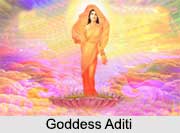 Aditi is the prehistoric goddess of Hinduism. She is one of the few goddesses mentioned in the Vedas. Goddess Aditi however has no single hymn addressed to her though she has been mentioned several times in the Vedas. She is featureless physically. Her outstanding aspect is her motherhood.
Aditi is the prehistoric goddess of Hinduism. She is one of the few goddesses mentioned in the Vedas. Goddess Aditi however has no single hymn addressed to her though she has been mentioned several times in the Vedas. She is featureless physically. Her outstanding aspect is her motherhood.
There is one old temple of Goddess Aditi which is located near the rock cut cave in Vizhinjam, Kerala. Goddess Aditi is worshipped by not only in Hinduism, but also in Buddhism and to honour her, twelve yellow candles are lighted by the Buddhists. The Hindus as an alternative use the butter lamps in her honour.
Etymology of Goddess Aditi
Aditi means someone who is unbound, unlimited and unfettered. It seems that she has no proper explanation. The name Aditi is mentioned in Vedas as the mother of Lord Surya and other celestial bodies or other gods Adityas (meaning sons of Aditi). The name "Aditi" signifies self-determination.
Legends of Goddess Aditi
The first mention of goddess Aditi is found in Rig Veda, which is approximate to have been composed around 1700-1100 BC. It is believed that before the creation of the universe, it was used to be placed within the womb of Goddess Aditi. She is considered as the internal never-ending source for all kinds of life. She is imagined in a variety of forms but her real identity is always uninterrupted. The celestial power of Goddess Aditi is the goddess of awareness, space, past, future and success.
She is often prayed for the wealth and safety. As a mother, she provides nourishment. She is free soul and unbound by anything. This is evident from the hymns that have been addressed to her. Aditi plays the role of Guardian of the celestial moral order. She is also associated with spaces and speech. In Vedanta she is linked to "mula prakriti" (nature). She is considered as the mother of twelve "Adityas" whose names include "Indra", "Parjanya", "Pusan", "Tvashta", "Aryaman", "Vivasvan", "Dhata", "Vishnu", "Ansuman", "Varuna", "Mitra", and "Urukrama". She is also considered as the mother of the Vamana avatar of Lord Vishnu.
Goddess Aditi is regarded as both the sky goddess, and earth goddess. She has been provided the status of first deity by the Vedic culture. In Rig Veda she is addressed as "Mighty". In Vedas she is described as the wife of Daksha. However in the Puranas there has been a shift in her role. In Matsya Purana she is the receiver of pair of ear rings from Lord Indra as a gift while the oceans were churning. In Vishnu Purana is the wife of Kashyapa. In Devi Bhagvata, Devika who is the mother of Lord Krishna is manifestation of Aditi. It is believed that those who live in heavens belong to Goddess Aditi. She is also worshipped for protection, for cattle, freedom from sin and forgiveness.









